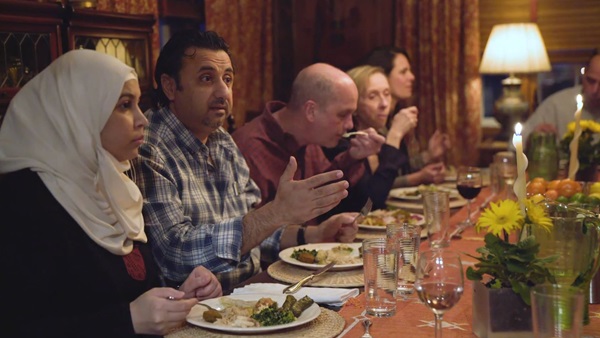Experiencing diversity
Guests packed the intimate dining room inside the Farfans' home in Maplewood, New Jersey.
Morrow Memorial United Methodist Church members were hosting their first Syrian Supper Club with their friend Abdul Alargha. He sat at the head of the table beaming, welcoming each guest, shaking hands and introducing himself. With a quiet sigh, the once successful Damascus businessman turned refugee and now asylum recipient leaned back in his chair, gently clasping his wife's shoulder. No longer destitute on the streets of Manhattan, Alargha was secure and settled in the welcoming embrace of New Jersey United Methodists who defied societal predispositions, fearful skepticism and political authorities to radically live the love of Jesus.
"We used to call this kind of relation in Arabic is like brother but not from my mother," said a smiling Alargha, describing his close friendships with the church members.
{1-3_vertical_ad}
The Supper Club brings Syrians and their friends in the community together twice a month for a delicious meal cooked by Syrian women who earn money from tickets sold. After the meal, Alargha shared his story of escape from Syria and separation from his family. In 2012, his companies were closed by the Assad regime after they were deemed "threats." Among them was a charitable organization supporting women widowed in the government's brutal crackdown on widespread dissent. After security forces forcefully entered his workplaces and home, Alargha flew to New York on a business visa with $400 and a laptop.
"I remember waking up in-flight thinking, ‘What am I doing on this plane? Where am I going to go?'" he exclaimed. Hours prior, he was a prosperous entrepreneur with a beautiful house and hundreds of employees. Meanwhile, his wife, Rana, and three children spent a year and a half on the run, stealthily hiding from the regime's authorities. When missiles rained, Rana would shelter her children by saying they were fireworks and special effects for the filming of a movie.
In 2015, several attorneys helped Alargha receive political asylum in the United States. The next day he began the process to retrieve his family.
Morrow Church was ready to help. The church worked with First Friends of New York and New Jersey, a refugee support agency, to facilitate the family's settlement and adjustment process. The people of Morrow Church helped the Alarghas find an apartment in Montclair, New Jersey, where they could embrace the future.
"I kneeled on the ground and took my wife's hand and held my kids' legs when they arrived at JFK airport," he said. "Sometimes I wake up at night and ask myself, ‘Are they really here or is this some kind of imagination?'"
Alargha says the United Methodists are his main supporters and have been "like a solid wall" against his back.
"Everything we have is because of their support, and we're so grateful."
After Morrow Church came to his assistance, Alargha returned the embrace by addressing the congregation during a worship service about his experiences as a refugee and joined youth from the church on a weekend trip to Washington, D.C., to meet with the state's legislators about immigration policies.
Employment remains the prime challenge for Syrian refugees including Alargha, who has taken on part-time work while he searches for a more stable job.
For Alargha, it's enough for him that there are people who want to help.
"Even if they don't help, just because they have this will, this is more than enough," he said. "As Jesus said, ‘Break bread.' I believe these United Methodists I have met represent Jesus himself. We found open arms here. I can tell you, frankly and honestly, what I have received from this church for me is like I have received it from Jesus himself."
Josh Kinney is editorial manager for The Relay, the monthly newspaper of the Greater New Jersey Conference.

